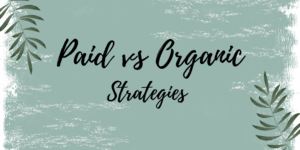In the world of marketing, you’ll see the words paid vs organic often. There are different approaches to succeed in the same goal of gaining traffic. Paid refers to a company investing in marketing campaigns to boost their reaches faster. Organic refers to traffic that come to a website on their own free will due to an interest in something posted or shared.

Paid strategies are things like pay-per-click (PPC) campaigns, sponsored ads, and banners. Basically, any form of advertisement that is paid to be seen on social media or even search engines like Google or Bing. (NewsBank. 2017). Organic is free but more credible, authentic reaches.
Paid vs Organic Pros and Cons
A pro to paid strategy is that it can be seen as a short cut to reaching a broader audience with faster results. Another pro is that you control the message and target audience. Some cons would be that “This form of traffic generation is often expensive since it involves spending money both for the marketing and for paying commissions to people.” (NewsBank. 2017). Another con would be the potential of decreasing trust due to the paying for attention rather than drawing them in naturally.
Organic strategies don’t cost any money, just effort. Visitors to the website generally come through search engines depending on ranking from Google or Bing. They also come through social media platforms like Facebook or Pinterest and using hash tags can be useful as well. Another way to gain organic traffic is by word of mouth or referrals either by friends or family.
Many pros to this strategy as no costs and more trustworthy as organic provide authentic content unlike paid ads. Organic can have the potential to reach a bigger audience if one has a great following to reshare which causes the credibility to increase higher. (NewsBank. 2017). The biggest con to this strategy is that it takes more effort to reach a broader audience than paid. This includes a time-consuming effort of consistent content being shared and using trending keywords for searcher queries. Another con is the fact of uncertain results.
Paid vs Organic Recommendations
The biggest recommendations I could provide of paid vs organic are some that I’ve learned along the way. Those are:
- Define your goals
- Understanding the difference between paid and organic strategies
- Sharing examples or case studies that have worked for others
- Discussing a budget for your desired strategy
- Listing expectations for your strategies
- Discuss potential approaches
It’s important to be informative and considerate to potential client needs and concerns or you lose their trust and credibility. Setting clear expectations, no matter what goals you set, is crucial to laying out a good plan of action to follow. One needs all the understanding they can get to make an informed decision with their desired marketing strategy.
Unethical Engagements
Some ways that organizations engage in unethical SEO practices are hidden texts or links, cloaking content, duplicated content, exploiting security, trading links, and plagiarism. (Balanco. 2024). An example of a real-life case is North Face. They were booed by the SEO community for manipulating Google image search results through Wikipedia. The agency updated Wikipedia’s images to make sure they appeared as top results within Google. (Gesenhues. 2019).
Some ways their brand was impacted was loss of trust and credibility. They exploited Wikipedia’s platform for personal gain and were heavily criticized by the SEO community for their unethical practices. This also impacted a negative perspective by consumers and possibly lost repeat customers.
Ethical practices are generally used in accepted search engine optimization techniques or code of conduct. These are clearly visible to visitors. Unethical practices are frowned upon as sneaky where corners are cut and cheating the accepted code of conduct. These are not usually visible to visitors.
Ethical Benefits
The benefits of being ethical in anything is to retain credibility and trust. Things that are visible and clear to all visitors and relative information can always be found with value. Having ethical practices shows fair methods being used and an increase in potential wages. You have better success ratings with ethical practices than unethical risks.
Reference
Balanco, Darryn. (2024). Ethical SEO vs. Unethical SEO. Optimus. https://optimus01.co.za/ethical-seo-vs-unethical-seo/
Gesenhues, Amy. (June 2019). The North Face booed by SEO community after manipulating Google image search results. Search Engine Land. https://searchengineland.com/the-north-face-gets-a-thumbs-down-from-seo-community-after-manipulating-google-image-search-results-317747
(September 2017). Organic Vs Paid: Which Traffic Is Right for Your Business. News Bank. https://infoweb-newsbank-com.eu1.proxy.openathens.net/apps/news/document-view?p=AMNP&docref=news/166FF45D03F0AAC0




